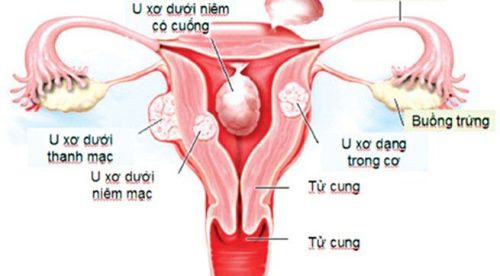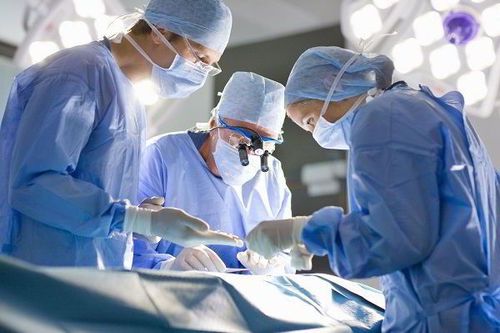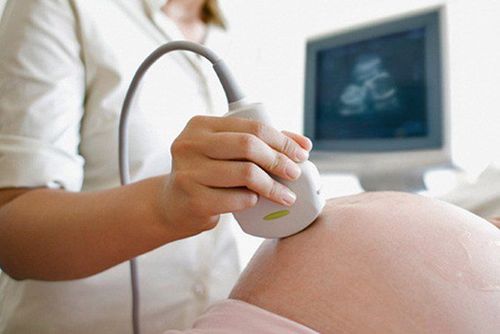This is an automatically translated article.
The article is professionally consulted by Master, Doctor Nguyen Ngoc Chien - Reproductive Support Center, Vinmec Times City International General Hospital.Uterine fibroids cause many women to fear the complications of this disease. So do uterine fibroids have a risk of developing into cancer, when do patients need to have surgery to intervene with uterine fibroids? The following article is the necessary information about uterine fibroids for your reference.
1. What are uterine fibroids?
Uterine fibroids are common gynecological diseases of all ages, especially women in the period of childbearing, pregnancy or menopause. This is an abnormal growth of cystic acne from the muscle of the uterus. The location of fibroids can be under the serosa, mucosa, in the muscle layer and even outside the uterus,...
So far, scientific researchers have not found the exact cause leading to to uterine fibroids. However, there are still some comments that the excessive increase of estrogen causes female hormone disorders, the consequences of being overweight, ... all increase the risk of uterine fibroids.

2. Are uterine fibroids at risk of developing into cancer?
In all cases, patients with uterine fibroids need screening and ultrasound to monitor tumor growth. Do not be subjective when you see that the tumor does not cause discomfort and ignore the periodic re-examination. Because fibroids are still more likely to grow silently, increasing in size and number. When the tumor grows large, it will be dangerous and directly life-threatening.About the possibility of uterine fibroids turning into cancer is very rare. Because fibroids are considered benign tumors, they cannot develop into cancer. However, patients should not be subjective but need early and timely treatment to control and avoid dangerous complications.
3. When to have surgery to treat uterine fibroids?
Patients with uterine fibroids absolutely must not self-treat without a diagnosis and appointment of a specialist doctor. Depending on the condition of the tumor, the doctor will recommend an appropriate treatment plan. If uterine fibroids are mild, the disease is detected early, then just take medicine to control and shrink the tumor.However, many cases of uterine fibroids require surgery. The reason is due to a number of factors as follows:
Fibroids make it difficult to get pregnant or easy to miscarry: Pregnant women with uterine fibroids can cause birth defects in the fetus, even miscarriage. For young women with uterine fibroids that cause low conception rates, there is a possibility of infertility. Causes menorrhagia and bleeding: Uterine fibroids make the mucosa vulnerable to menorrhagia and bleeding. Abdominal pain due to twisted tumors. When the tumor has grown large, at this time the organs around the uterus are also affected such as the bladder (causing urinary urgency), colon (leading to constipation or Diarrhea ) but medication is not effective If the above cases are encountered, the doctor will perform surgery to directly intervene in the fibroids, reduce the symptoms of the disease and prevent the fibroids from dying. uterine recurrence, the rate of uterine preservation.

4. Uterine fibroid surgery method
Uterine fibroid surgery will be based on the size, location and condition of the disease to have an appropriate method. Currently, uterine fibroids are intervened through embolization or surgery. Embolization is a method of blocking the arteries that feed the fibroids and is only done for women who have given birth. The most common surgical methods are open surgery, laparoscopic surgery and robotic laparoscopy.Open surgery: After anesthesia, the doctor will make an incision from the abdominal wall to access the tumor. The tumor was removed from the uterus and the wound sutured. Open surgery will cause pain, blood loss, and slow recovery time. Laparoscopic surgery: With fibroids under the peritoneum or in the myometrium, suitable size will be laparoscopic surgery. Similar to open surgery, the patient will be given general anesthesia, then put a laparoscope and specialized surgical instruments into the uterus. When the surgery is done, the doctor closes the incision and disinfects it. Laparoscopic surgery helps to overcome the disadvantages of open surgery such as: high aesthetics, less bleeding and invasion, limited complications, fast recovery time. Robotic laparoscopic surgery: This is considered the most modern and superior method in the treatment of uterine fibroids. Robotic laparoscopic surgery ensures high accuracy, easy control. The incision is only 1-2 cm to help reduce the risk of infection, high aesthetics. Less pain, quick recovery should shorten hospital stay, save costs. In some cases of severe uterine fibroids, patients have to remove the entire uterus to prevent complications, robotic surgery helps patients recover physically faster.
In order to help customers detect and treat other gynecological diseases early, Vinmec International General Hospital has a basic gynecological examination and screening package, helping customers to detect inflammatory diseases early, screen gynecological cancer (cervical cancer) even if there are no symptoms.
Basic gynecological examination and screening package for female customers, has no age limit and may have the following symptoms:
Abnormal vaginal bleeding; Menstrual problems: irregular periods, irregular periods; Abnormal vaginal discharge (with a bad odor, a different color than usual); Pain, itching in the vagina; Female customers have several risk factors such as poor personal hygiene, unsafe sex, abortion,...; Female customers have other symptoms such as: Abnormal vaginal discharge, itching, vaginal pain, abnormal vaginal bleeding.
Please dial HOTLINE for more information or register for an appointment HERE. Download MyVinmec app to make appointments faster and to manage your bookings easily.














